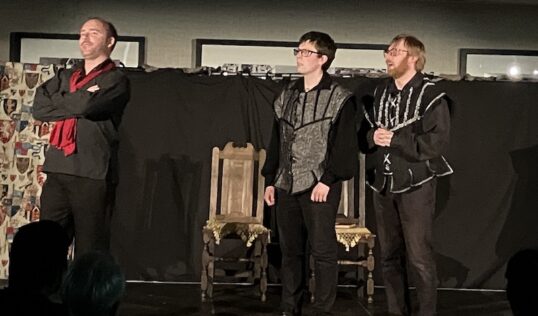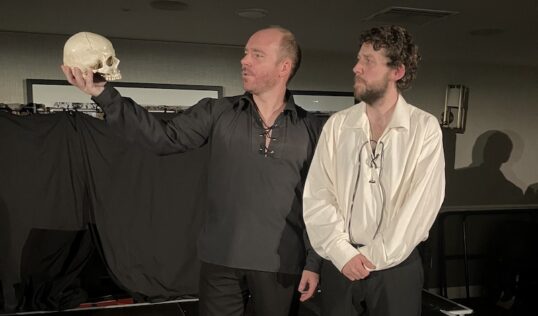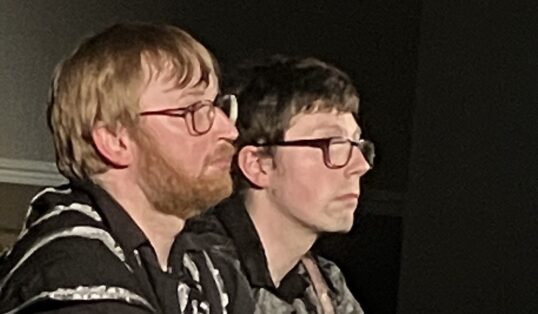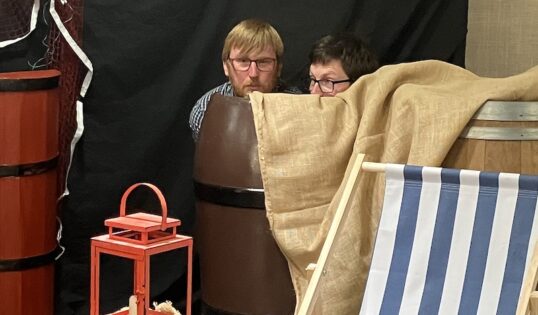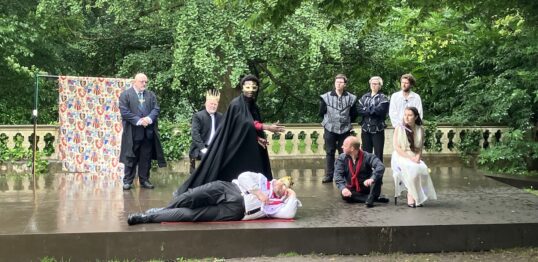Hamlet / Rosencrantz and Guildenstern Are Dead by Tom Stoppard
★★★☆☆ Pacy and ★★★★☆ Slick
The Royal Scots Club (Venue 241): Mon 21 – Sat 26 Aug 2023
Review by Thom Dibdin
New Edinburgh amateur company Necessary Cat make their debut performances for the last week only of the fringe with the elegantly twinned pairing of Shakespeare’s Hamlet and Tom Stoppard’s Rosencrantz and Guildenstern Are Dead.
Necessary Cat founder Angela Harkness Robertson directs both productions and has assembled a talented 12-strong company to take on a speedy, not-quite breathless 100 minute jaunt through Hamlet for the early evening show, and a slightly more nuanced telling of the Stoppard for the later evening.
Both productions work equally well as separate entities. There is little question, however, with the one company taking on both and playing the same parts in each, that they work best as a pair.
It is not just a real treat to be reminded of the Shakespeare before going into Stoppard’s back-stage view of Hamlet, as seen by minor characters Rosencrantz and Guildenstern. That refreshing of the memory, together with seeing the actors take on the same roles, is really something special. Also, for those who see both, Shakespeare’s final lines of Hamlet are filleted out in the edit but appear in the Stoppard.
For the Hamlet, Harkness Robertson doesn’t hang around. In this minimally staged production, the emphasis is on pushing the play on, not lingering over it. Although, fortunately, this is not at the expense of meaning. Colin Povey is particularly fine and clear in the title role, ensuring that the basics of the plot are also clearly set out, even if some of the nuance might be lost.
guilt
Povey’s Hamlet is not just out for revenge, either. He’s pushing the boundaries of performance in his portrayal of madness. His performance is primarily for his stepfather King Claudius, played with a nicely escalating level of guilt by Chris Allan, and Hilary Davies’ Gertrude, caught between her love for her son and her obviously pragmatic decision to marry her dead husband’s brother.
Despite Hamlet’s clear warning to Ophelia of his pretence, she doesn’t quite get it and Amber Lipman does an excellent job of portraying someone who has genuinely lost their mind. As she ends up believing Hamlet’s performance, so she and her family become lethally embroiled in Hamlet’s personal family feud.
Frank Skelly is suitably solid and pedantic as Ophelia’s father, Polonius. Newcomer Testimony Adegbite, who has come through the Lyceum and Strange Town youth theatres, is maybe a little overwrought as her brother, Laertes – although his early intensity makes a lot of sense of the final scenes.
In the supporting roles, James Scott is clear and well defined as Hamlet’s best pal Horatio. Given the expectations on the later show, Alan Sunter as Guildenstern and Jonathan Whiteside as Rosencrantz are suitably jarring, clearly out of their depth in the Danish court.
Ben Blow could have been born to play the doubling role of the Player King and Gravedigger. As the latter, he provides a welcome moment of levity and natural breaking of the fourth wall. But it is his particularly commanding Player King that really excels, even if he only has Adegbite as Lucianus and Alma Forsyth as his Player Queen, for a company.
light and shade
While this is a streamlined version of the script (Caitlin Carter’s Osric is almost lost), it is not the headlong rush it might be. Harkness Robertson finds time bring light and shade to the production, ably supported by assistant director Alma Forsyth, with Dug Campbell providing evocative soundscapes and well lit by Elissa Webb.
When it comes to that final scene, fencing coach Ben Hanley ensures that the swordplay between Hamlet and Laertes appears murderously natural, without dragging it out.
Back in 1966 when one-hour venue slots had yet to be invented, young playwrights could debut three act plays at the fringe and get away with it. Well, almost. Famously, the first night of Stoppard’s Rosencrantz and Guildenstern Are Dead attracted only one paying audience member and six critics. Five of whom hated the play.
Fortunately, this fascinating extension of Shakespeare’s enquiry into the nature of performance – that Harkness Robertson so eloquently brings out in her Hamlet – did not get lost.
The Stoppard, likened by many to Waiting for Godot in its use of two central characters whose chatter seemingly goes round and round, is a mind-boggling script for the audience to take in, let alone to perform. Back, and now in the title rolls, Sunter and Whiteside ensure it all goes smoothly.
obsessive
It is something of a tour-de-force from the pair, who bring out the comedy and pathos of the two characters’ situation. Lost back stage, not knowing where they have come from, Rosencrantz and Guildenstern question their reason for existence and play games of logic and existential consequence to try and work it out.
Sunter is every inch the nerdy obsessive as Guildenstern, constantly picking at the details. Whiteside has a more of laissez-faire attitude as Rosencrantz, not so intent on the “why” of what happens, just glad when it goes his way, what ever the odds.
For the most part, the main characters of Hamlet appear like palpable ghosts, particularly Hamlet himself, wandering off a stage that Guildenstern peers into, reporting back to Rosencrantz, but is behind a curtain for the audience.
The arrival of the Players backstage, on their way to take on their significant role in Hamlet, really rounds out the play. Blow is once again magnificent, now pimping his players – expanded to include any and every unused cast member of Hamlet – as the script confronts the nature of performance head-on, toying with the point where it blurs over into pornography and even prostitution.
event theatre
While there is the potential for this to wander, Harkness Robertson keeps the dialogue tight for the first two acts; expanding things out for the third act, which moves onto the ship taking Rosencrantz, Guildenstern and Hamlet to England. The final scene is a most satisfying coup-de-théâtre, emphatically tying both productions together.
For all the low-ceilinged production values that come with playing a venue more appropriate to a wedding reception, Necessary Cat’s pairing of Shakespeare’s Hamlet and Tom Stoppard’s Rosencrantz and Guildenstern Are Dead is a stunningly worked piece of event theatre which, as such, is as notable as anything at the EIF.
Running times:
Hamlet: One hour and 40 minutes (no interval).
Rosencrantz and Guildenstern are Dead: Two hours and 10 minutes (including one interval)
The Royal Scots Club (Princes Royal Suite), 29-31 Abercromby Place, EH3 6QE (Venue 241)
Monday 21 – Saturday 26 August 2023
Hamlet daily at 6 pm
Rosencrantz and Guildenstern are Dead: daily at 8pm.
Tickets and details
Hamlet: Book here.
Rosencrantz and Guildenstern are Dead: Book here.
Necessary Cat links:
Facebook: @necessarycat.
Twitter: @CatNecessa89795.
Instagram: @necessarycatlimited.
ENDS
#MadeInEdinburgh








